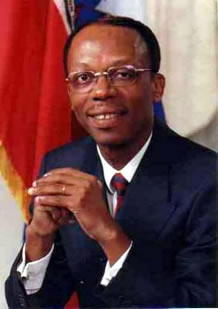Haiti on the verge of civil war
 Armed opposition seized cities all over the country claiming President Jean Bertrand Aristide's resignation.
Armed opposition seized cities all over the country claiming President Jean Bertrand Aristide's resignation.
Haiti's president Jean Bertrand Aristide, once a popular leftist religious leader, might follow Georgian Eduard Shevarnadze's steps, since the armed opposition has seized cities around the country to oust him from power. At least 40 people were killed during last weekend clashes, but Aristide says he would not quit. Protests against Aristide increased in frequency and intensity since Mr. Aristide's party won flawed elections in 2000. The opposition refuses to take part in a new election unless Mr. Aristide resigns, which he refuses to do before his term ends in 2006.
According to local official reports, loyal forces recaptured yesterday a number of towns controlled by the opposition. However, the situation in the capital, Port Au-Prince remains tense as hundreds of people loot shipping containers and rebels keep the key city of St. Marc, in the West of the country, as their main stronghold.
Aristide said he was victim of an anti-democratic coup, as the opposition set fire to public buildings, releasing what they say are political prisoners, in country’s jails. On Saturday police withdrew from the larger city of Gonaives in the north-west after failing to defeat the rebels in street battles which left at least nine dead, witnesses said.
However, not only armed rebels claim for Aristide’s resignation, but also the legal opposition. Its leaders said they would not run into new elections until Aristide quits.
News agencies reported that in Port-au-Prince, tens of thousands of government supporters marched on Saturday to mark the third anniversary of Mr. Aristide's second inauguration as president. Opposition leaders had planned a protest march in the capital, but said they cancelled it due to security concerns.
Haiti has been historically the Latin American poorest country. Last month, Haiti marked 200 years as an independent State from the French Empire. The anniversary sparked the protests against authorities all over the country, as the police quelled an anti-government demonstration that day.
Jean-Bertrand Aristide was born in 1953 and educated at a Roman Catholic school and seminary. He was ordained in 1982 and became a strong supporter of liberation theology, which pressed the church to engage with social problems, including poverty and oppression. In 1986 he helped to establish a home for street children.
At that time, Aristide was a democratic leader who enjoyed of great support from the poor masses of the country. He fought against the dictatorship of Jean-Claude Duvalier. But his political stance and growing support angered Haiti's incumbent leaders, and he was the target of several assassination attempts in the 1980s.
Shortly after Duvalier's fall in April of 1986 Aristide led a memorial march to notorious Fort Dimanche prison in memory of the 30,000 Haitians who lost their lives there under Duvalier. The Haitian military opened fire on the crowd of praying demonstrators but Aristide continued a live broadcast on Radio Soleil during the massacre, confirming his reputation as a fearless opponent of the regime.
In the fall of 1990 Haiti prepared for presidential elections that many feared would end in violence as they did in 1987 when voters were massacred at the voting poles. On the final day of registration Aristide announced his candidacy for the presidency. The announcement electrified the country and after a six week campaign that Aristide dubbed "Lavalas" or a cleansing flood, he was elected president in Haiti's first free and fair election with an overwhelming 67% of the vote.
Aristide and his supporters control Haiti's political life since then.
Hernan Etchaleco
Pravda.Ru
Subscribe to Pravda.Ru Telegram channel, Facebook, RSS!





